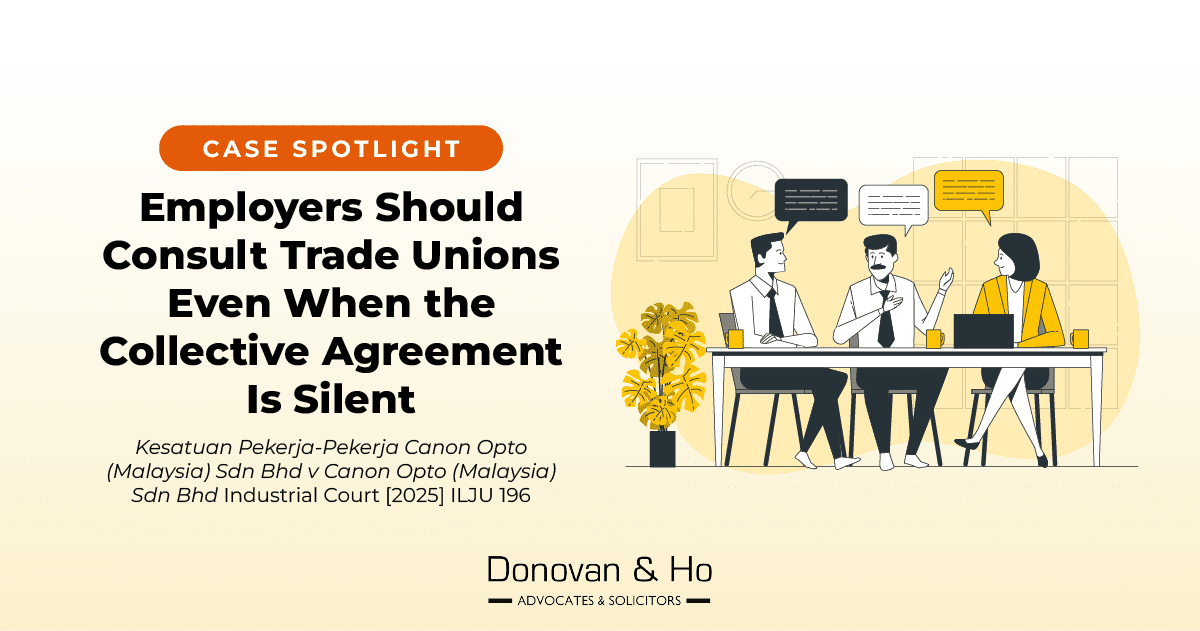Under most collective agreements, employers are required to consult the trade union before making key decisions that affect workmen. But what happens when the collective agreement is silent on the need for consultation in a particular situation? Should the employer still engage the union?
This issue was addressed in the case of Kesatuan Pekerja-Pekerja Canon Opto (Malaysia) Sdn Bhd v Canon Opto (Malaysia) Sdn Bhd [2025] ILJU 196.
Factual Background
- Kesatuan Pekerja-Pekerja Canon Opto (Malaysia) Sdn Bhd (“the Union”) had entered into a Collective Agreement (“CA”) with Canon Opto (Malaysia) Sdn Bhd (“the Company”).
- In 2020, the Company introduced a Mutual Separation Scheme (“MSS”) to terminate the service of a selected group of employees based on medical and performance considerations. The Union argued that it should have been consulted before the implementation of MSS and that the Company had breached Articles 2, 3, 4 and 20 of the CA.
- Under Article 20, employees with less than ten years of service were entitled to one month’s salary per year of service, while those with ten years or more were entitled to 1.25 months’ salary per year. The MSS, however, offered only 0.8 month’s salary per year of service, which was less favourable.
- The Company argued that Article 20 applied only to retrenchment and not to a voluntary MSS. It further contended that employees had accepted the MSS voluntarily and that there was no obligation to notify or consult the Union.
Findings of the Industrial Court
The Industrial Court found in favour of the Union, holding that the Company had breached Article 20 of the CA. The Court rejected the Company’s argument that the MSS was outside the scope of the CA. It held that the Company was obligated to consult or discuss the matter with the Union, since the exercise involved a massive reduction of manpower.
The Court emphasised that any decision that affects the employment of union employees must involve the Union, even if the CA does not expressly say so.
Importantly, the Court held that the employees’ acceptance of the MSS was not truly voluntary. The offer letters were prepared solely by the Company and sent directly to employees without the Union’s knowledge or participation. In the absence of advice from the Union, employees may not have been aware of their rights under Article 20(6)(a) and (b). This lack of information and consultation undermined the element of voluntariness.
The Court also observed that the Company failed to provide a cogent justification for implementing the MSS during the Movement Control Order.
Ultimately, the Court concluded that the Company had acted in bad faith and had used the MSS to circumvent the compensation formula under the CA. The exercise was therefore in breach of Article 20.
Key Takeaways
This case highlights that even if consultation is not expressly required or spelt out in the collective agreement, it remains a cornerstone of good industrial relations practice. Engaging the union early reflects good faith, supports transparency, and helps maintain industrial harmony.
The decision also reinforces that union involvement is closely linked to the issue of voluntariness. Consultation helps ensure employees are fully informed of their rights under the collective agreement, preventing any perception of an information gap. Where the union is excluded from the process, the element of voluntariness may be undermined.
***
This article was written by Leow Ho Eng (Associate) with assistance of Shoo Joedee from Donovan & Ho’s employment law practice.
Donovan & Ho is a law firm in Malaysia, and our employment practice group has built a reputation for providing strategic employment advice to local and global organisations. Our team of employment lawyers provide advice on employment law and industrial relations including review of employment contracts, policies and handbooks, advising on workforce reductions, and managing dismissals of employees for poor performance or misconduct. We also represent clients in unfair dismissal claims and employment-related litigation.
Have a question? Please contact us.






